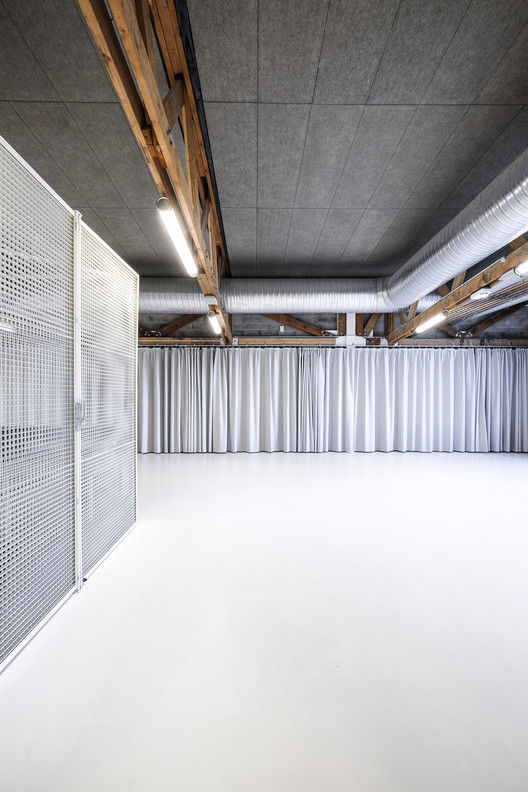
-
Architects: Paul Vincent, Architecte
- Area: 1725 m²
- Year: 2019

Text description provided by the architects. The initial situation is symptomatically trivial: a supermarket built in 1983, located on the outskirts of Châteaulin, in Brittany, France, between pavilions and small collective dwellings, is abandoned due to a lack of customers. Made available to local associations, its new users (about a hundred associations) will soon find great freedom in this volume: forums, concerts, shows, garage sales, fairs, etc... without this structure ever really being adapted to its new function, becoming increasingly uncomfortable to use over the years.

The numerous stakes of this adaptive reuse are above all part of economic and functional logic. Here the word architecture corresponds to a series of elementary, strategic, and strictly necessary decisions. The original volumetry is simplified by the demolition of its protuberances and canopies. Only a new small addition will be made to signify the entrance. The objective is to not pretend to be anything other than an old supermarket while ensuring the flexibility and comfort of use worthy of a multifunctional space.
The project of transformation answers 4 main stakes:

Improvement of thermal performance. Renovation of the envelope with new insulation and installation of a double-flow ventilation system that can accommodate up to 1200 people simultaneously. Installation of suspended radiant panels ensuring a rapid rise in temperature and a homogeneous distribution of heat.



Improved acoustic performance. The lack of soundproofing has been a source of nuisance for local residents during events generating a high noise level. The lack of acoustic treatment inside the hall itself also generated far too much reverberation.
An economical and global solution allowed us to solve these two problems: the generalization of the use of wood fiber panels as a lining for all facade walls. The technical solution also becomes aesthetic and economical.

Improvement of the building's functionality. Programmatic elements have been added to improve the operation of the hall: two dressing rooms, a catering area, technical rooms. Others have been modified and relocated to meet new standards. A kiosk was created to house a reception desk, lockers, and a bar. This modular kiosk allows its configuration to be adapted to the different types of events that take place. A curtain system allows the reconfiguration of the hall.

Improvement of the image and perception of the building. The original volume, complexified because it was flanked by technical rooms, canopies, and unsightly openings, has been simplified.

A new facade was put in place to replace the aging metal cladding. This natural aluminum skin echoes the industrial and economic origins of the structure while establishing a dialogue with its immediate environment. The blind building comes to life by reflecting the changing light of the sky and landscape. The building vibrates and offers a constantly renewed face.
Inside, the architectural qualities of the existing structure have been highlighted. Associated with new lighting, the acoustic lining of the walls, and the curtain system, a white resin floor completes the domestic and monumental, warm, and industrial quality of this new space.





















































